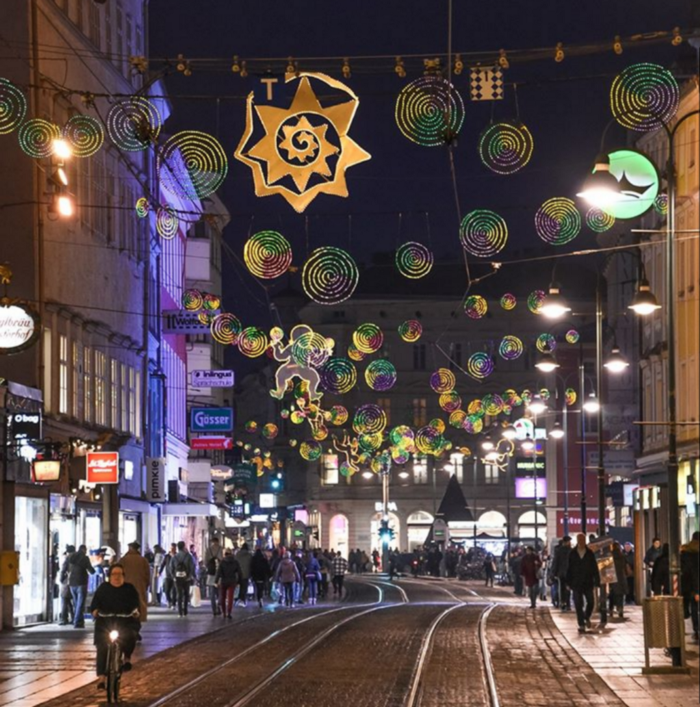Snow is falling in Linz today, which makes the kids very happy. I put on some ski gear and rode my bike to work, alongside dozens of other people doing the same.
The snow fits the scenery perfectly. Linz is fully decked out for Christmas. Lights are strung above the streets: clear lights, globes, stars, and multi-colored spirals.
Linz boasts three different Christmas markets within a half-mile radius. The market at Main Square has tasty Glühwein. Volksgarten features classical music, animatronic elves, and a Ferris wheel. Pfarrplatz even has a petting zoo.
Last weekend, we went to a Christmas gospel concert at the cathedral. The lead singer spoke fluent German, which the audience loved. He must have a connection to Austria; he’s been performing here every year for over a decade.

The next day, we attended a small party hosted by friends who are also from the Bay Area. I tried speaking a little German with their neighbors, but it wasn’t happening. We stuck to English.
On Learning German
I expected Max and Zoe to pick up German faster than Alison and I would, but we’re all progressing at about the same pace. Almost every store, restaurant, movie theater, or office in Linz has some English, so intensive language training doesn’t feel essential.
At home, Alison and I practice German using an app called Duolingo. I also listen to a German podcast produced by an Irish guy who learns along with his listeners. Once a week, there’s a German class at my work, and Alison and I are both taking extracurricular classes. Mine starts Friday.
We’ve gotten comfortable with numbers, but calculating in German is tricky because the structure is reversed. Instead of saying “twenty-two,” you say “two and twenty.” That split second of translating in my head often causes me to miss whatever comes next.
Telling time is flipped too. 8:30 is “half nine,” not “half past eight.”
And then there are the articles. What a mess.
“The” is an article. French, Italian, and Spanish use gendered articles, so the form changes with the gender of the noun. For example, in Spanish: el niño (the boy, masculine) and la niña (the girl, feminine).
Like Spanish, German has masculine and feminine articles, but it also has a neutral article. Der (masculine), die (feminine), and das (neutral).
For instance:
- Der Junge (the boy, masculine).
- Das Mädchen (the girl, neutral).
Wait, neutral? Yes, apparently neutral nouns often refer to diminutives, meaning small or cute things. But that rule isn’t consistent. For example, die kleine Katze (the little cat) is feminine. Why? No one knows. Kill me.
To make things even more confusing, the ending of a noun doesn’t always help. Der Junge ends in “e,” so you might think all nouns ending in “e” are masculine. Nope. Die Katze (feminine) ends in “e” too. You just have to memorize the article for each word.
And it gets worse. Articles change based on the noun’s role in the sentence. For example:
- Der Hund (the dog, masculine) when it’s the subject.
- Den Hund (the dog, masculine) when it’s the direct object.
Possessive articles are another layer of fun. Can’t wait to tackle those.
Then there’s sentence structure. German loves to put the second verb at the very end of the sentence. For example:
- “I would like you and your wife to join us for dinner next week” translates to:
“I want you and your wife next week dinner with us join.”
It’s like a slow reveal. You know it’s about dinner, but the action isn’t clear until the very last word. Eat dinner? Cook dinner? Regurgitate dinner? Oh, join! You want us to join you for dinner. Sorry, we can’t.
For now, the slow reveal isn’t too overwhelming because our vocabulary is still limited. But as we learn more words, I imagine it’ll feel like the flipped numbers: a brief pause to figure things out, and the rest of the sentence is lost.
The word for “repeat” is wiederholen. It feels appropriate.
To summarize: Christmas is here. German is hard. :)
Time to sign off and earn my daily Duolingo points before bed.
Gute Nacht!
